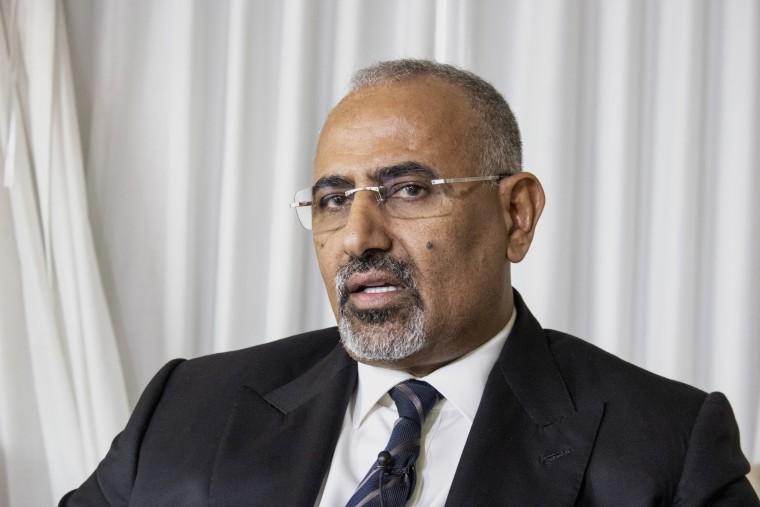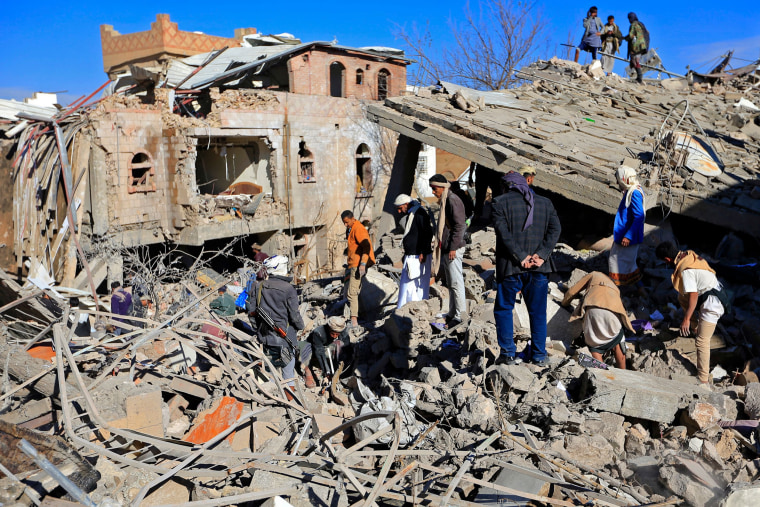U.S. ignored warnings about Houthi threat, Yemeni leader says
DAVOS, Switzerland — The U.S. was warned about the dangers Houthi rebels posed to the Middle East before Israel’s war with Hamas but “they didn’t do anything,” the vice president of Yemen’s United Nations-recognized government told NBC News.
Maj. Gen. Aidarus al-Zubaidi said he met with American and British officials on the sidelines of the United Nations General Assembly in September and told them that the Iran-backed militant group was regrouping and rearming during a pause in fighting in its long-running war with a coalition led by Saudi Arabia.
“They wrote everything down,” al-Zubaidi said Sunday at the World Economic Forum in Davos, Switzerland, where Secretary of State Antony Blinken and national security adviser Jake Sullivan are expected to speak about returning stability to the Middle East.
“They didn’t do anything,” said al-Zubaidi.
NBC News has approached the State Department for comment.

.Ted Shaffrey / AP file
Around three weeks after al-Zubaidi said he gave his warning, on Oct. 7, Hamas launched multipronged attacks on Israel killing 1,200 people and taking around 240 hostage. Israeli officials say around 100 still remain in captivity after scores were released in late November as part of an exchange for Palestinian prisoners.
After Israel launched its military assault on Gaza that has so far killed more than 24,000 people, according to Palestinian health officials, the Houthis declared support for Hamas and began launching missiles at Israel and bombarding ships in the Red Sea.
On Monday, U.S. Central Command said in a statement that Houthis “fired an anti-ship ballistic missile from Houthi-controlled areas of Yemen and struck the M/V Gibraltar Eagle, a Marshall Islands-flagged, U.S.-owned and operated container ship.”
Yemen forms the eastern side of the Bab al-Mandeb strait — or “the Gate of Grief” — a 16-mile stretch of water that marks the entrance to the Red Sea, one of the most important shipping lanes in the world. CNBC reported earlier this month that the attacks had disrupted around $200 billion in international trade, as companies have chosen to avoid the waterway and take the longer route around the horn of Africa instead.
Yemen, the poorest country in the region, has been wracked by civil war since August 2014, when the Houthis seized Yemen’s capital, Sanaa, and forced President Abed Rabbo Mansour Hadi and his government into exile.

Unwilling to accept the prospect of Yemen being controlled by a militant organization backed by its regional rival, Iran, the following year Saudi Arabia responded by starting a war against the group to try to restore the internationally recognized government to power.
But despite support from the U.S., Britain and several other nations, who armed the Saudis with fighter jets and bombs, and provided them with military expertise, the conflict lasted far longer than expected and proved costly for Riyadh. With little hope of victory, Saudi Crown Prince Mohammed bin Salman scaled back his military operation and entered peace talks with the Houthis last year.
The war also resulted in what the United Nations, in December 2021, called “the largest humanitarian crisis in the world” — with 80% of Yemen’s 32 million population in need of aid.

Al-Zubaidi initially remained loyal to President Hadi’s government and was one of the leaders that helped to expel the group from the port city of Aden, where the internationally recognized coalition government is currently seated.
But although he sits on Yemen’s Presidential Leadership Council, he also heads the Southern Transitional Council, a secessionist movement that wants independence for South Yemen, which was its own state from 1967 to 1990.
Al-Zubaidi, who has survived several assassination attempts, is also the de-facto leader of the Southern Movement, the STC’s paramilitary wing, which maintains control of a large swath of the country’s south.
“The Houthis are not serious about peace, he said, adding that they used the United Nations peace talks with Saudi Arabia last year, to “delay things, to prepare.”
After President Joe Biden called the Houthis’ behavior in the Red Sea “outrageous” and said that he was willing to call the…
Read More: U.S. ignored warnings about Houthi threat, Yemeni leader says

